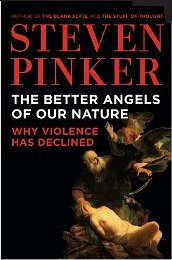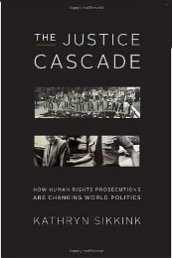In Review:
New Publications on International and Comparative Law
The Better Angels of
Our Nature: Why Violence Has Declined
By Steven Pinker,
Viking: The Penguin Group.
2011
The Justice Cascade:
How Human Rights Prosecutions Are Changing World Politics
By Karhryn Sikkink. W.W.Norton & Company. 2011

Reviewed By: James G. Apple, Editor-in-Chief, International Judicial Monitor and President, International Judicial Academy
If there was ever any doubt about the value of international law and international courts in reducing the amount of violence in the world, and in holding accountable nations and leaders who promote, condone, or incite violence, two recent books put to rest such doubts. An interesting aspect of these two books, which have important implications for the world of law and courts, as well as for the wider world, is that they were not written by judges or lawyers: one was written by a family psychologist who does not mention very often international law in his book, and the other was written by a professor of political science.
The Better Angels of Our Nature: Why Violence Has Declined, is the effort of Steven Pinker, family professor in the Department of Psychology at Harvard University. It is a 696 page tome that thoroughly explores the subject contained in its subtitle - the decline of violence in human history and the reasons for such decline. It brings a message of hope and optimism to a world that is seemingly consumed with violence. Its message is certainly reassuring to those who labor for the cause of the rule of law in the world.
The opening sentence in the book, in the Preface, states:
This book is about the most important thing that has ever happened in human history. Believe it or not – and I know that most people do not – violence has declined over long stretches of time, and today we may be living in the most peaceable era in our species existence.
This reviewer would add: This book may be one of the most important books of the 21st century.
Pinker’s first task in support of his thesis is to convince the reader that there has been in fact a “decline of violence” in human history, particularly in more recent history. This is a difficult task because, as Pinker acknowledges, his thesis is counterintuitive. Most Americans, and probably most citizens in countries around the world, if asked, would say that violence in the world has increased, particularly in the most recent past. They would probably cite the two world wars and the genocides of the 20th century and then the many wars since World War II: the Korean War, the Vietnam War, the war in Afghanistan, the wars of Southern Africa, to name only a few. In addition they would probably cite the violence that appears continually on the around–the–clock newscasts from CNN, Fox News, and Al-Jazeera. Pinker, however, convincingly argues his case, and he does it throughout the book with many authoritative graphs, charts, and statistics, accompanied by brilliant analyses.
The author, in the Preface, helps the reader by identifying six trends covered by the first seven chapters, beginning with the “transition from the anarchy of the hunting, gathering, and horticultural societies” to the post World War II era. These can briefly described as: decrease in rates of violent death over millennia, decline in rates of homicide over a subsequent 500+ period of years, abolition of “socially sanctioned forms of violence” over several centuries, the ending of war between great powers since the end of World War II, the decline in conflicts of all kinds since the end of the Cold War, and finally a growing, contemporary “revulsion against aggression on smaller scales, including violence against ethnic minorities, women, children, homosexuals, and animals.”
The organization of this well-written, entertaining book makes it easy for the reader to follow the author’s thesis. The first chapter, titled “A Foreign Country,” (from the phrase “the past is a foreign country”) focuses on the distant past, which he describes as a shockingly violent time. He reminds the reader how violent early human history was. This narration is followed by a series of chapters dealing successively with hunter–gatherer societies to late medieval culture to the wars of the 19th century. These chapters are followed by those which explain why violence has been declining: the humanitarian revolution, the long peace, the new peace and the “Rights Revolution.” Another chapter analyzes “inner demons” and the “better angels” of human nature, and the final chapter paper poses a question to which he attributes the main reason for his writing of this book: “what are you optimistic about?” Pinker answers his own question by explaining that, from the writing of the book, he has gained not so much optimism as gratitude – a sense of appreciation that there has been in fact a reduction in violence over the long period of human history and throughout the world, that there are specific reasons for such decline, and that such decline can be sustained through human understanding of its causes and subsequent human activity.
 If Steven Pinker's book could
be described as non-legal in character but valuable for the legal order,
political science professor Kathryn Sikkink work, The Justice Cascade, is definitely legal in character. It is very much the outcome of a personal
journey by the author, who began her odyssey in Montevideo, Uruguay in 1976,
during the autocratic and ruthless regime of Juan Maria Bordaberry, who
created, after his ascension to the presidency of that country, the “torture
chamber of Latin America.”
If Steven Pinker's book could
be described as non-legal in character but valuable for the legal order,
political science professor Kathryn Sikkink work, The Justice Cascade, is definitely legal in character. It is very much the outcome of a personal
journey by the author, who began her odyssey in Montevideo, Uruguay in 1976,
during the autocratic and ruthless regime of Juan Maria Bordaberry, who
created, after his ascension to the presidency of that country, the “torture
chamber of Latin America.”
The theme of this book is the development, over a period of some 40 years, of the idea of individual criminal accountability under international law for the actions of national leaders against their citizens. She noted that President Bordaberry viewed himself as immune from judgment for his crimes and those under him in the Uruguayan military, as indicated in a 1974 speech:
[T]he armed forces must enjoy supreme tranquility, knowing that their stance of having accompanied and supported the government in the historic events of June 1973 cannot be judged by the citizenry….And this stance cannot be the object of a judgment.
He was wrong. Thirty-three years later he was indicted by a Uruguayan judge for murder, tried, convicted, and sentenced to 30 years in prison.
Professor Sikkink uses in the book the term “justice” to mean “legal accountability for crimes.” She identifies three ideas that “underpin” this concept of justice: (1) “the most basic violations of human rights – summary execution, torture, and disappearance - cannot be legitimate acts of state and thus must be seen as crimes committed by individuals,” (2) individuals who commit these crimes should be prosecuted, and (3) the “accused are also the bearer of rights, and deserve to have those rights protected in a fair trial.”
Professor Sikkink, in the Introduction, notes that “important change is occurring” and identifies, somewhat similar to what Steven Pinker describes in his book, a “striking trend.” This trend she identifies as “an unprecedented spike in worldwide efforts to address past human rights abuses by focusing on individual criminal responsibility.” If her book had been written and published well before that of Professor Pinker, he would have undoubtedly referred to it in his own book as further explanation of his thesis. Professor Sikkink concludes her Introdution with a prediction that has arisen out of her research and writing: the “persistence of the demand for justice: human rights prosecutions will not go away.”
In her first chapters the author focuses on three countries that were in the forefront of holding “their own state officials criminally accountable for past human rights violations”: Greece, Portugal and Argentina. Greece and Portugal were first in this effort, reactions in 1974 to military dictatorships established in both nations, in 1933 for the former country and in 1967 for the latter. The military coup in Argentina occurred in 1976, leading to what is now known as “the disappeared”: 30,000 Argentine citizens who were arrested and then vanished under the military junta. In all three countries there were prosecutions and convictions of the military leaders when the hated dictatorships were overthrown. The Argentine prosecutions were to have a significant international consequence: the principal prosecutor against the Argentine junta, Luis Moreno Ocampo, became the first chief prosecutor for the International Criminal Court after it began operations in 2002.
Professor Sikkink next addresses what she calls the “streams of the justice cascade” by which she means the momentum gained by disparate developments in two different “streams” over a period of almost 50 years. The first stream began with the Nuremberg trials in the immediate postwar years, followed many years later by the establishment of the International Criminal Tribunal for the Former Yugoslavia in 1993 and subsequent similarly created tribunals in The Hague and elsewhere. The second stream is the domestic and foreign prosecutions for individual leader accountability as exemplified by the prosecutions in Greece, Portugal and Argentina.
International criminal tribunals are not universally popular. One criticism is that they actually impede progress to improve human rights in the particular country where abuses occurred and make matters worse. From her research she categorically rejects such criticism, arguing that human rights prosecutions actually strengthen the cause of human rights in the particular country and also lead to cross border deterrence.
The author devotes an entire chapter to the position of the United States in the justice cascade. The narrative is not a particularly gratifying experience to the U.S. reader as she reviews the human rights violations of the Bush administration in the aftermath of 9/11. She notes the oft-repeated observation of scholars of international relations: the real test of international law is its ability to influence the actions of even the most powerful states. Unfortunately international law proved no impediment to some of the actions of the U.S. government during that period of time. She observes that the US case illustrates a central point of the realist theory of international politics: powerful states are able to disregard international rules at will. In the long term however she notes that even the United States is not totally beyond the reach of the international human rights laws and humanitarian laws that it helped codify.
The Professor’s concluding chapter on “Policy, Theory and The Justice Cascade” is a masterful summation of the first seven chapters. She comments in the final paragraph of the book that: “The fact that the justice cascade is embodied in both domestic and international law and in domestic and international institutions makes it unlikely that the trend [of individual criminal responsibility of national leaders for criminal acts against their own people] will be reversed. And her concluding sentence echoes a view of Steven Pinker: “The new world of greater accountability that we are entering now, for all of its problems, offers hope of reducing violence in the world.”

 International
Judicial Monitor
International
Judicial Monitor